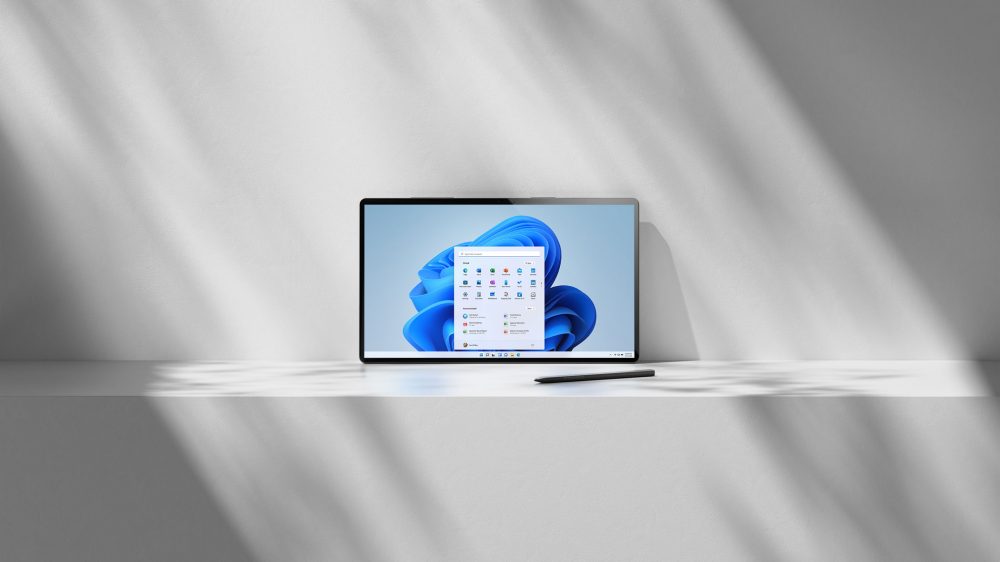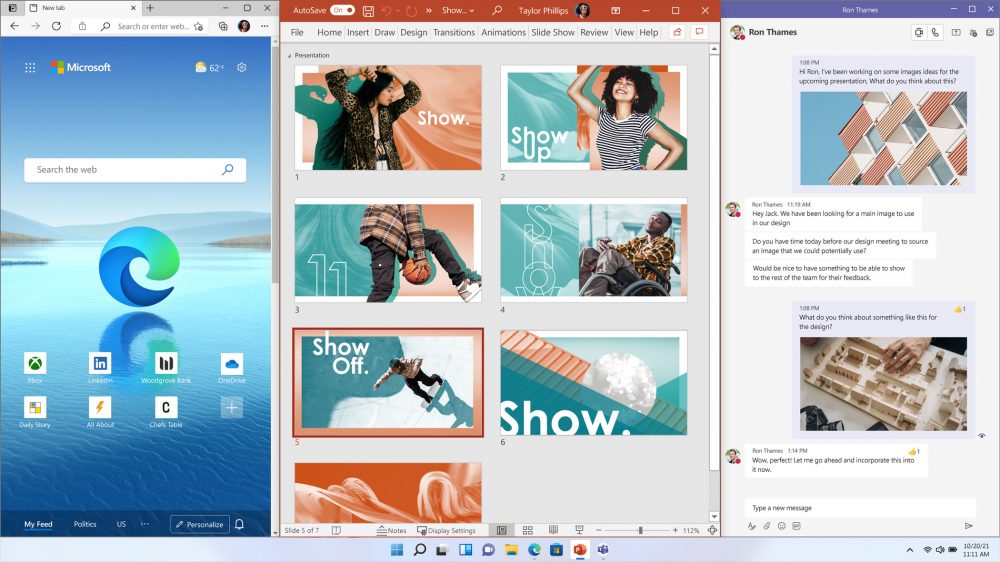Microsoft announces Windows 11 with redesigned UI, third-party app payments, and more
Microsoft CEO jabs Apple with “openness” rhetoric


Microsoft has officially announced its next major operating system, Windows 11, which promises a slew of features targeting hybrid workers and developers alike.
Openness was the key talking point for CEO Satya Nadella when unveiling the new operating system, which will ship later this year. "Windows recognizes that there is no personal computing without personal agency," he said. Nadella added, "We want to remove the barriers that too often exist today and provide real choice and connection."
The new operating system will feature support for Android apps purchased from Amazon's app store. In a swipe at Apple, the company also revamped the Microsoft Store, allowing developers to use their own payment systems when charging for apps. This lets developers keep 100% of the revenue.
"Windows has always stood for sovereignty for creators and agency for consumers," said Nadella, who highlighted its multi-marketplace support as a key differentiator from Apple in an interview with the Wall Street Journal today. "Operating systems and devices should mould themselves to our needs and not the other way around."
Openness didn't seem to be the central theme in at least one Windows 11 feature announcement, though.
In a move sure to worry other collaboration and video conferencing application providers, Microsoft has integrated Teams more closely into the operating system. This integration creates an interface that places contacts into the start bar and makes it easier to enter Teams video calls.
One welcome feature the company revealed in preview versions of Windows 11 is a universal mute button. This allows you to mute all video calling systems, so you can rest assured your mic isn't hot.
Get the ITPro daily newsletter
Sign up today and you will receive a free copy of our Future Focus 2025 report - the leading guidance on AI, cybersecurity and other IT challenges as per 700+ senior executives
Windows 11 will also feature some user interface (UI) changes. Users will arrange their application windows into pre-configured layouts. The operating system will retain these layouts when you switch between external monitors and laptop displays. This feature, called Snap Layouts, is one of several enhancements designed to make the keyboard-free experience more intuitive when using Windows in a tablet format.

The new UI will also include new visual cues for resizing windows and a start menu that’s centered on the screen rather than off to the side. Windows 11 will also feature a redesigned on-screen keyboard with swipe-to-type features and emojis.
RELATED RESOURCE

How to maximise the value of your data and apps with IaaS
Free yourself from infrastructure complexity
Other new features integrated directly into the start menu will include Windows Widgets, which will be tabs of content, including news tailored to users’ content viewing habits. One intriguing feature will be the ability to tip content creators through the widget platform.
Alongside other cosmetic changes, like rounded corners, the system will also feature some under-the-hood changes. Updates will be 40% smaller and will happen in the background, so people can keep working through them.
On the gaming side, Microsoft will bring across a few features from the Xbox platform. Games that support HDR for better contrast and more vibrant colors will now benefit from that feature on Windows 11. The operating system will also offer Direct Storage, which will use the graphical processing unit (GPU) to load data without burdening the CPU. The company will also integrate the Xbox Game Pass system directly into the desktop operating system.
There was a notable lack of talk about privacy during the launch, which is a theme Apple has continually promoted in its products. Instead, Microsoft seems to differentiate itself from Apple by emphasizing its platform’s openness and willingness to relinquish control.
Microsoft's support for Android apps might also give it some traction over Google's Chromebook platform, which has enjoyed meteoric sales in recent months.
"Throughout its history Windows has been a democratizing force for the world", Nadella said in the announcement wrap. Microsoft settled with the DoJ on monopoly charges in 2001 for giving preferential treatment to its Internet Explorer browser. In the same year, It also called open source software "a cancer," though it apologized for the statement in 2020.
Microsoft has since built support for Linux directly into the operating system. An analysis of leaked Windows 11 code suggests it might be able to run graphical Linux apps on the Windows desktop.
Danny Bradbury has been a print journalist specialising in technology since 1989 and a freelance writer since 1994. He has written for national publications on both sides of the Atlantic and has won awards for his investigative cybersecurity journalism work and his arts and culture writing.
Danny writes about many different technology issues for audiences ranging from consumers through to software developers and CIOs. He also ghostwrites articles for many C-suite business executives in the technology sector and has worked as a presenter for multiple webinars and podcasts.
-
 Bigger salaries, more burnout: Is the CISO role in crisis?
Bigger salaries, more burnout: Is the CISO role in crisis?In-depth CISOs are more stressed than ever before – but why is this and what can be done?
By Kate O'Flaherty Published
-
 Cheap cyber crime kits can be bought on the dark web for less than $25
Cheap cyber crime kits can be bought on the dark web for less than $25News Research from NordVPN shows phishing kits are now widely available on the dark web and via messaging apps like Telegram, and are often selling for less than $25.
By Emma Woollacott Published
-
 Tiny11 review: Windows 11 with only 2GB of RAM
Tiny11 review: Windows 11 with only 2GB of RAMReview A version of Windows 11 for older machines that don't meet the full requirements
By Nik Rawlinson Published
-
 Red Hat Enterprise Linux becomes foundational operating system for Cohesity Data Cloud
Red Hat Enterprise Linux becomes foundational operating system for Cohesity Data CloudNews New strategic partnership between Red Hat and Cohesity aims to drive innovation in the data security and management space
By Daniel Todd Published
-
 Ubuntu shifts to four-week update cycle
Ubuntu shifts to four-week update cycleNews Critical fixes will also come every two weeks, mitigating the issues involved with releasing prompt patches on the old three-week cadence
By Richard Speed Published
-
 AlmaLinux follows Oracle in ditching RHEL compatibility
AlmaLinux follows Oracle in ditching RHEL compatibilityNews Application binary compatibility is now the aim with 1:1 now dropped
By Richard Speed Published
-
 How big is the Windows 10 cliff-edge?
How big is the Windows 10 cliff-edge?ITPro Network With some comparing the upcoming Windows 10 end of life to Windows XP, we ask members of the ITPro Network for their insight
By Jane McCallion Published
-
 Everything you need to know about the latest Windows 11 updates - from bug fixes to brand-new features
Everything you need to know about the latest Windows 11 updates - from bug fixes to brand-new featuresNews Two new cumulative updates are on the way and will be installed automatically on Windows 10 and Windows 11 machines
By Rory Bathgate Published
-
 How to download a Windows 11 ISO file and perform a clean install
How to download a Windows 11 ISO file and perform a clean installTutorial Use a Windows 11 ISO to install the operating system afresh
By John Loeppky Published
-
 We could all benefit from better Windows and macOS accessibility features
We could all benefit from better Windows and macOS accessibility featuresOpinion Today’s accessibility features can help you work through a nasty injury, but there’s still plenty of room for improvement
By Barry Collins Published